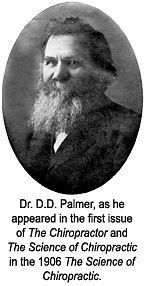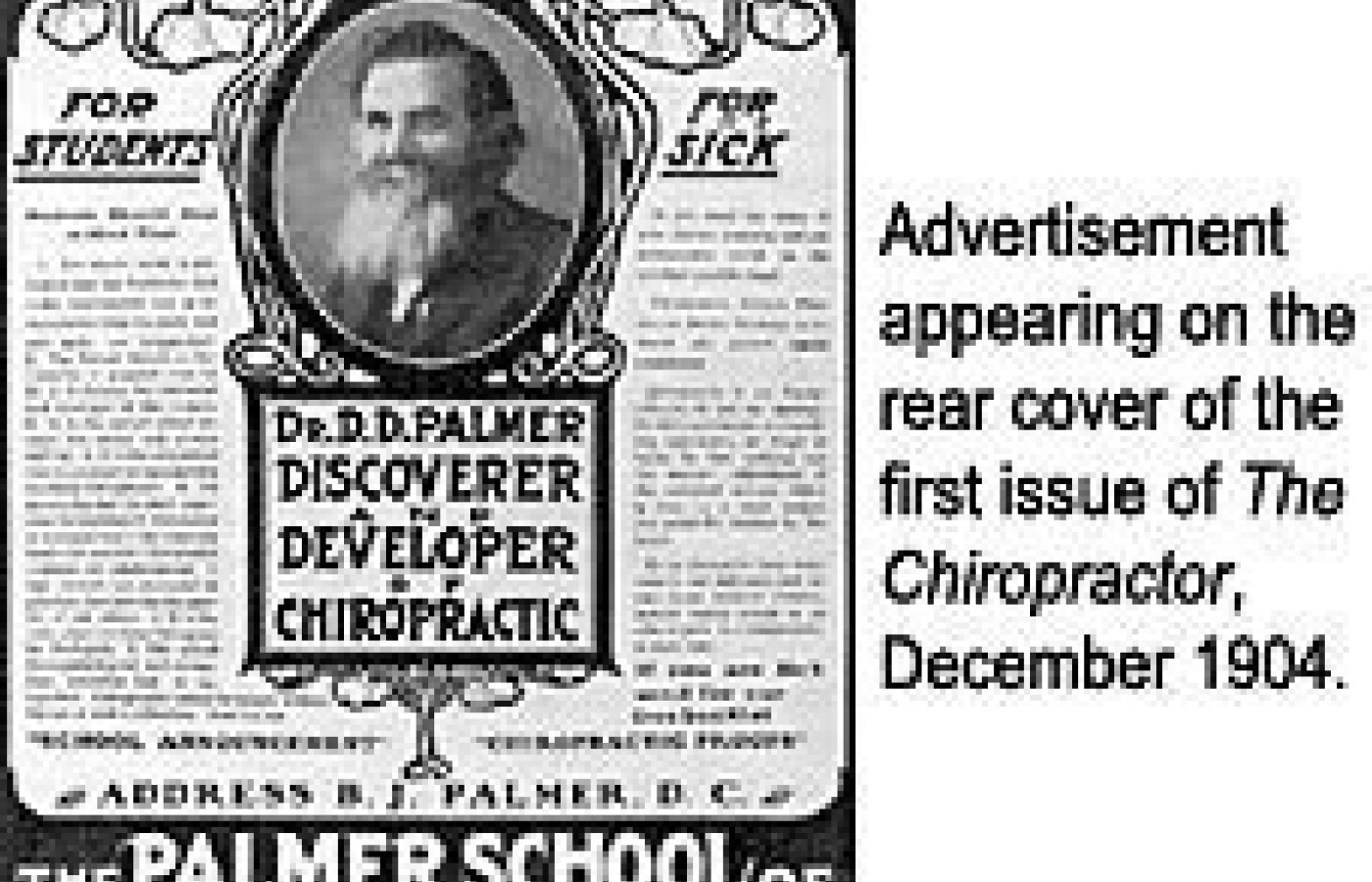It’s a new year and many chiropractors are evaluating what will enhance their respective practices, particularly as it relates to their bottom line. One of the most common questions I get is: “Do I need to be credentialed to bill insurance, and what are the best plans to join?” It’s a loaded question – but one every DC ponders. Whether you're already in-network or pondering whether to join, here's what you need to know.
The Birth of The Chiropractor
The chiropractic profession, consisting of a few dozen doctors at most, was less then a decade old when the Palmers released the first issue of their magazine, The Chiropractor, in December 1904. It was not the first Palmer periodical; that distinction belonged to the newspaper-sized advertiser that Dr. D.D. Palmer had published since the late 1880s under such titles as The Educator, The Magnetic Cure and The Chiropractic.1,2 Neither was The Chiropractor the first "professional" journal; that is, one intended for an audience of chiropractors, rather than merely for prospective students and patients. The latter distinction appears to belong to The Backbone, published by 1901 Palmer alumnus Solon M. Langworthy, DC, who competed with the Palmers for students and patients at his American School of Chiropractic & Nature Cure in Cedar Rapids, Iowa.3
The Chiropractor, however, would be one of the longest lasting and best known of chiropractic periodicals (continuing in monthly publication until November/December 1961), and serving multiple functions along the way. Not the least of these would be its role as the "official organ" of the several professional societies B.J. founded and led: the Universal Chiropractors' Association (today's ACA) and the Chiropractic Health Bureau (today's ICA).

The masthead indicated that the new periodical was published by the Palmer School of Chiropractic and copyrighted by B.J. Palmer. Single copies were available for 5 cents each, or a year's subscription for 50 cents, "which may be sent in postage stamps." The first issue listed a number of articles on its cover:
|
This first issue made what was probably liberal use of photographic images, in addition to the more standard line drawings of the times. Among the imagery was a photo of Harvey Lillard, one of the elder Palmers (the photo would appear again in various advertisements and in a textbook, The Science of Chiropractic, published by B.J. in 1906); and a picture of Old Dad Chiro's class in Santa Barbara, California, during July 1903.


This first issue of The Chiropractor was noteworthy in several respects. It marked the founder's return to Davenport and the Palmer School after his year or more spent in California.4 Chagrined by the competition and lack of recognition as founder accorded him by his former pupil, Dr. Langworthy, The Chiropractor was a vehicle to reassert his authority as "discoverer and developer of chiropractic." Old Dad Chiro used this first issue to introduce his newly revised theory of chiropractic - what would come to be known as the "foot-on-the-hose." Nerve pinching, as the sole concern of the chiropractor (in contrast to the supposedly exclusive concern of osteopaths with mechanical obstructions of the circulation), was related as a new discovery:5
Who Discovered That the Body is Heated by Nerves During Health and Disease?
It will be of interest to "The Chiropractor" reader to learn how Dr. D.D. Palmer discovered that the body is heated by nerves, and not by blood.
In the afternoon of July 1, 1903, in suite 15 of the Aiken block, Santa Barbara, Cal., D.D. Palmer was holding a clinic. The patient was Roy Renwick of that city. There were present as students, H.D. Reynard, Ira H. Lucas, O.G. Smith, Minora C. Paxson, A.B. Wightman and M.A. Collier, in all told, eight witnesses.
The patient, A.R. Renwick, had the left hand, arm, shoulder and on up to the spine, intensely hot. Dr. Palmer drew the attention of the class to the excessive heat condition of the portion named; the balance being normal in temperature. He then gave an adjustment in the dorsal region which relieved the pinched nerve on the left side, also the excessive heat of the left upper limb; but he had thrown the vertebra too far, which had the effect of pinching the nerves on the right side, and immediately causing the upper limb to be excessively hot. He asked the class, "Is the body heat by blood or by nerves?" He then left them for two or three minutes. He returned and asked them, "Is the body heat by blood or by nerves?" The class unanimously answered "Nerves." Thus was this new thought originated.
The above circumstance is substantiated by a letter written that evening to the doctor's son, B.J. Palmer, D.C., also several following letters which further explained that the caloric of the body, whether normal or in excess, was furnished by calorific nerves. These letters were placed with other original writings in one of the ten bound volumes in order to prove the autobiography of Chiropractic from its birth. Here are the original writings which show beyond the shadow of a doubt who originated the principle of Chiropractic. The doctor's son anticipated that some sneak thief would try to appropriate the credit of originality, and would desire to rob his father of the honor justly due him, thus, his reason for compiling his original writings.6
Although D.D. would later deny that nerves are ever pinched in the intervertebral foraminae,7,8 the 1904 theory would prevail among a majority of chiropractors throughout the 20th century. The evolution of Palmer's theory is captured in a comparison of his two notions about the cause and cure of cancer: the former published for the general public in the 1897 issue of his advertiser, The Chiropractic, and the latter - showing no concern about circulatory factors-in the new periodical:
| ||||||
Old Dad Chiro's theories and his publishing tendencies would continue to evolve. In 1908, he commenced publication of The Chiropractor Adjuster, issued by the D.D. Palmer College of Chiropractic in Portland, Oregon (forerunner of today's Western States Chiropractic College: WSCC). The contents of The Chiropractor Adjuster would subsequently constitute much of the text of his 1910 volume, The Chiropractor's Adjuster: The Science, Art and Philosophy of Chiropractic.7 By this time, the father of chiropractic had refuted his 1904 notions of nerve pinching in favor of the idea of nerve stretching or slackening due to "impingement."

The birth of The Chiropractor a century ago set in motion much of the conceptual apparatus by which the profession would be guided for years to come. Although largely forgotten today, it is a moment in chiro-time that merits re-examination. That first issue of The Chiropractor is available for inspection at the libraries of Canadian Memorial Chiropractic College, Palmer College-Davenport, Texas Chiropractic College, and perhaps other sources.
References
- Gielow, Vern. Old Dad Chiro: A Biography of D.D. Palmer, Founder of Chiropractic. Davenport, IA: Bawden Brothers, 1981.
- Keating, Joseph C. B.J. of Davenport: The Early Years of Chiropractic. Davenport, IA: Association for the History of Chiropractic, 1997.
- Gibbons, Russell W. Solon Massey Langworthy: keeper of the flame during the "lost years" of chiropractic. Chiropractic History 1981;1:14-21.
- Zarbuck MV, Hayes MB. Following D.D. Palmer to the west coast: the Pasadena connection, 1902. Chiropractic History December 1990; 10(2):17-22.
- Keating, Joseph C. "Heat by nerves and not by blood": the first major reduction in chiropractic theory, 1903. Chiropractic History December 1995;15(2):70-77.
- Palmer DD. Who discovered that the body is heated by nerves during health and disease? The Chiropractor December 1904;1(1):12-4.
- Palmer DD. The Chiropractor's Adjuster: The Science, Art and Philosophy of Chiropractic. Portland Printing House: Portland, OR, 1910.
- Palmer DD. The Chiropractor. Los Angeles: Beacon Light Printing Company, 1914.
Joseph Keating Jr., PhD
Phoenix Arizona
jckeating@aol.com



